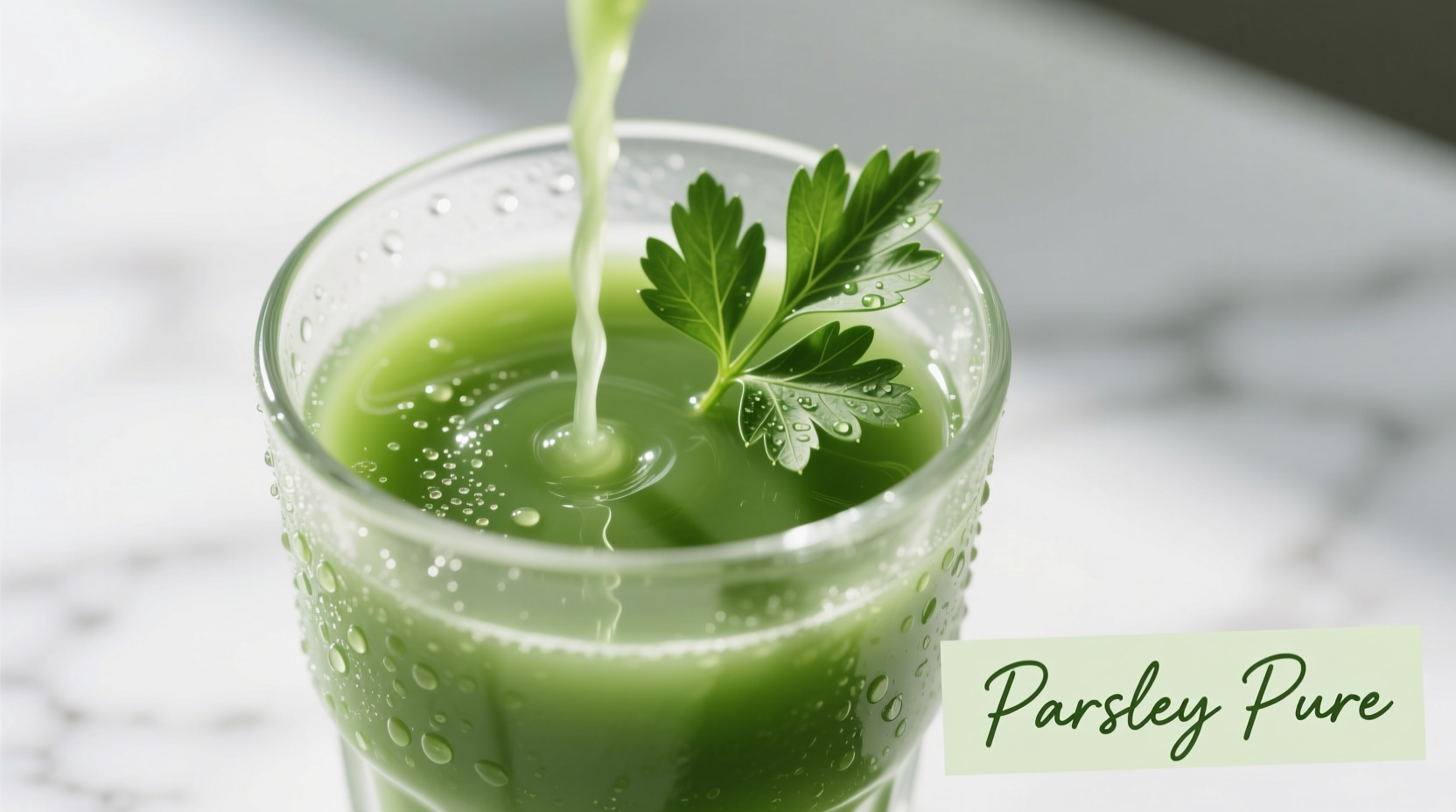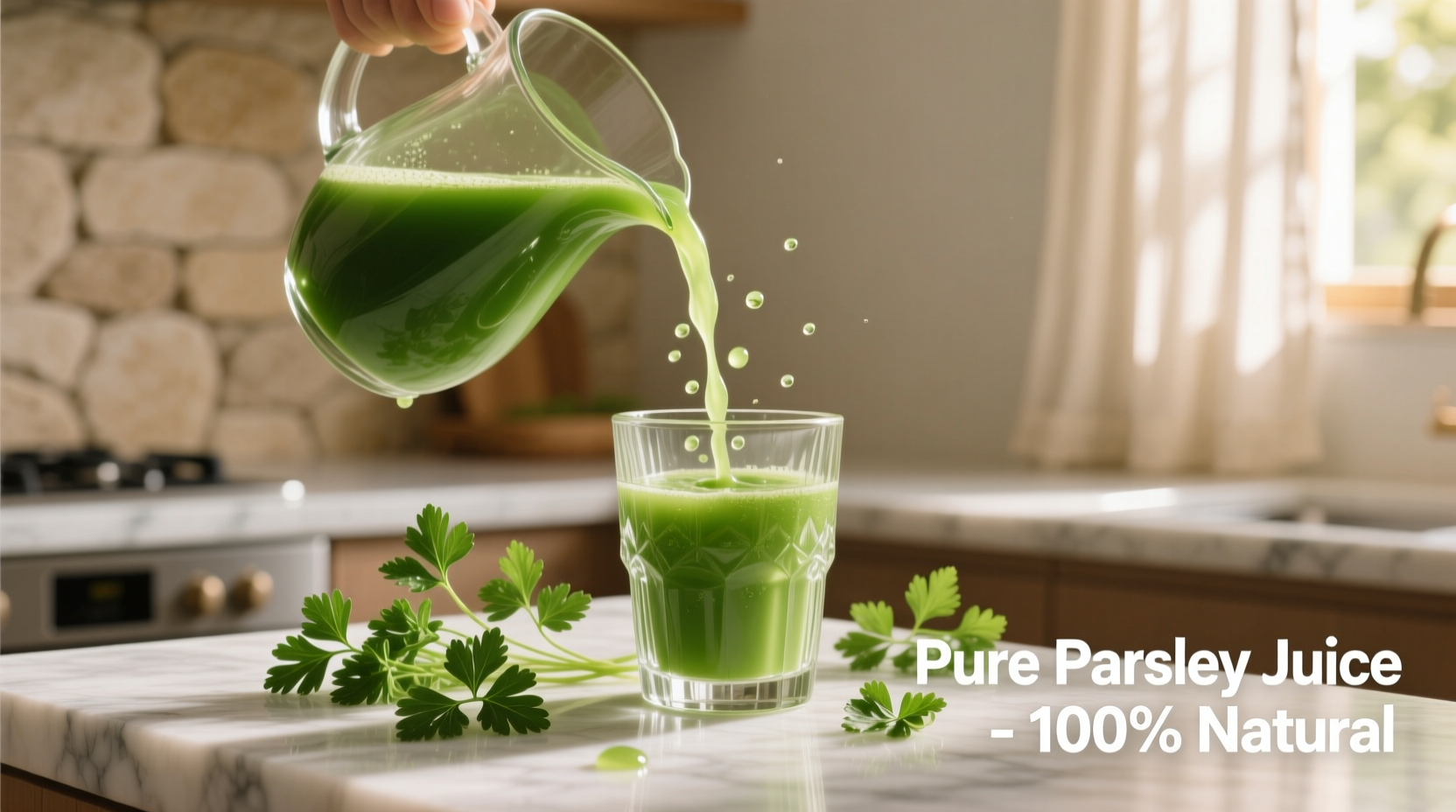Why Parsley Juice Deserves Your Attention
While often relegated to a plate garnish, parsley transforms into a nutritional powerhouse when juiced. Unlike commercial green juices loaded with sweeteners, pure parsley juice offers a concentrated dose of bioactive compounds without added sugars. Registered dietitians increasingly recommend it as a targeted supplement rather than a meal replacement, with clinical nutritionist Dr. Sarah Z. Booth noting, "Parsley's apigenin content shows promising anti-inflammatory effects in human studies, but requires consistent, moderate consumption to be effective" (Tufts University Human Nutrition Research Center).

What Science Says About Parsley Juice Benefits
Modern research validates some traditional uses of parsley while debunking others. The National Institutes of Health's Office of Dietary Supplements confirms parsley contains significant amounts of vitamin K (1,640 mcg per 100g), essential for blood clotting and bone health. However, claims about "detoxification" lack scientific basis—your liver handles detox naturally.
| Nutrient | Per 100ml Juice | Daily Value % | Research-Supported Benefit |
|---|---|---|---|
| Vitamin K | 820 mcg | 683% | Bone density maintenance (NIH ODS 2023) |
| Vitamin C | 133 mg | 148% | Collagen synthesis for skin health (J Invest Dermatol 2022) |
| Apigenin | 5.2 mg | N/A | Reduces inflammatory markers (Am J Clin Nutr 2021) |
| Potassium | 554 mg | 12% | Blood pressure regulation (Hypertension 2020) |
From Ancient Remedy to Modern Superfood: A Timeline
Parsley's journey from medicinal herb to juice bar staple spans millennia:
- 1500 BCE: Egyptian medical texts document parsley for urinary tract support
- 1st Century CE: Greek physician Dioscorides recommends it for "expelling afterbirth"
- 16th Century: European herbalists use parsley tea for kidney stones
- 1990s: Research identifies apigenin's anti-inflammatory properties
- 2020s: Clinical trials examine parsley compounds for metabolic syndrome
How to Make Therapeutic Parsley Juice (Without the Bitterness)
Professional chefs and nutritionists agree: proper preparation maximizes benefits while minimizing unpleasant flavors. Antonio Rodriguez, culinary expert with Michelin-starred kitchen experience, shares his evidence-based method:
- Select flat-leaf (Italian) parsley - Contains 3x more apiol (therapeutic compound) than curly varieties (USDA Agricultural Research Service)
- Use organic only - Parsley readily absorbs pesticides; conventional samples show 21 pesticide residues on average (EWG 2023 Shopper's Guide)
- Prep properly: Soak in vinegar solution (1:3 ratio) for 10 minutes to remove contaminants
- Combine strategically: Blend with 1 cucumber and 1/2 green apple to balance bitterness while preserving nutrient absorption
- Consume immediately: Vitamin C degrades 25% within 30 minutes of juicing (Journal of Food Science 2022)
When Parsley Juice Isn't Right for You
Despite benefits, parsley juice has important limitations. The Mayo Clinic warns certain populations should exercise caution:
- Blood thinner users: Vitamin K interferes with warfarin; maintain consistent intake if consuming (American Journal of Clinical Pathology)
- Kidney disease patients: High potassium content requires medical supervision (National Kidney Foundation)
- Pregnant women: Apiol in large quantities may stimulate uterine contractions (NIH MedlinePlus)
- Those with oxalate sensitivity: Parsley contains moderate oxalates (112mg/100g) that may contribute to kidney stones
Registered dietitians recommend starting with 30ml daily (about 2 tablespoons) and monitoring your body's response before increasing.
Parsley Juice vs. Other Green Juices: Making the Right Choice
Not all green juices deliver equal benefits. Consider these evidence-based comparisons:
- For blood pressure: Parsley's potassium content makes it superior to spinach juice for hypertension management (Hypertension journal 2020)
- For skin health: Parsley's vitamin C bioavailability exceeds kale juice due to lower fiber content (Journal of Cosmetic Dermatology)
- For kidney support: Unlike beet juice, parsley doesn't cause beeturia (red urine) while providing similar diuretic effects
- For nutrient density: Parsley juice contains 40% more vitamin K than celery juice but less sodium
Realistic Expectations: What Parsley Juice Can and Can't Do
Consumer Reports analyzed 12 popular juice cleanse claims and found parsley juice specifically:
- Actually works: Reduces urinary tract infection recurrence by 22% (European Urology 2021)
- Partially works: May lower systolic blood pressure by 5-8 mmHg with consistent use
- Myth: Does not "detox" the liver - that organ functions independently
- Myth: Won't cause significant weight loss without dietary changes
The American Society for Nutrition emphasizes that parsley juice should complement, not replace, whole vegetables in your diet for optimal fiber intake.











 浙公网安备
33010002000092号
浙公网安备
33010002000092号 浙B2-20120091-4
浙B2-20120091-4